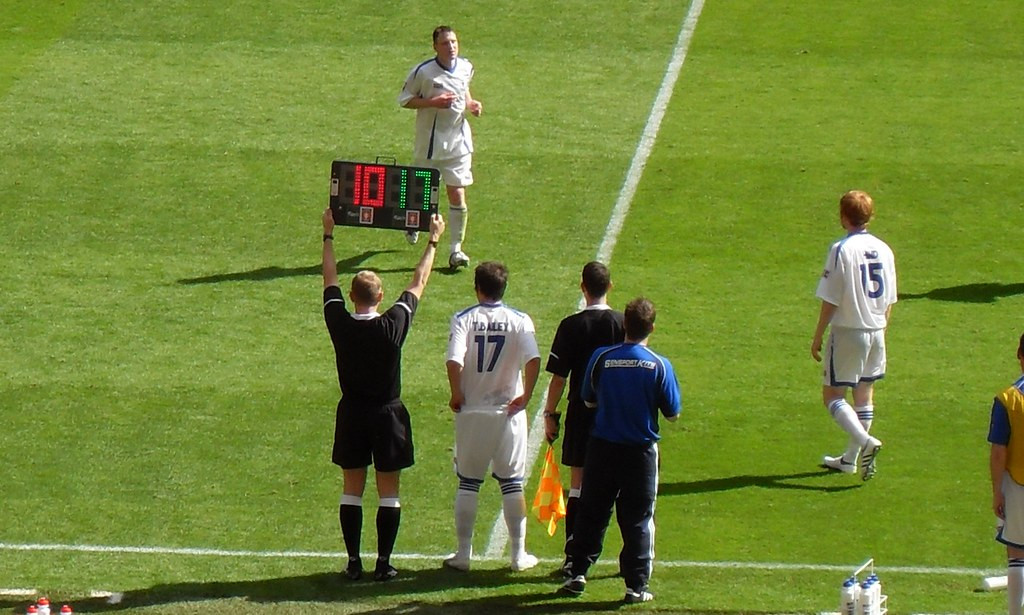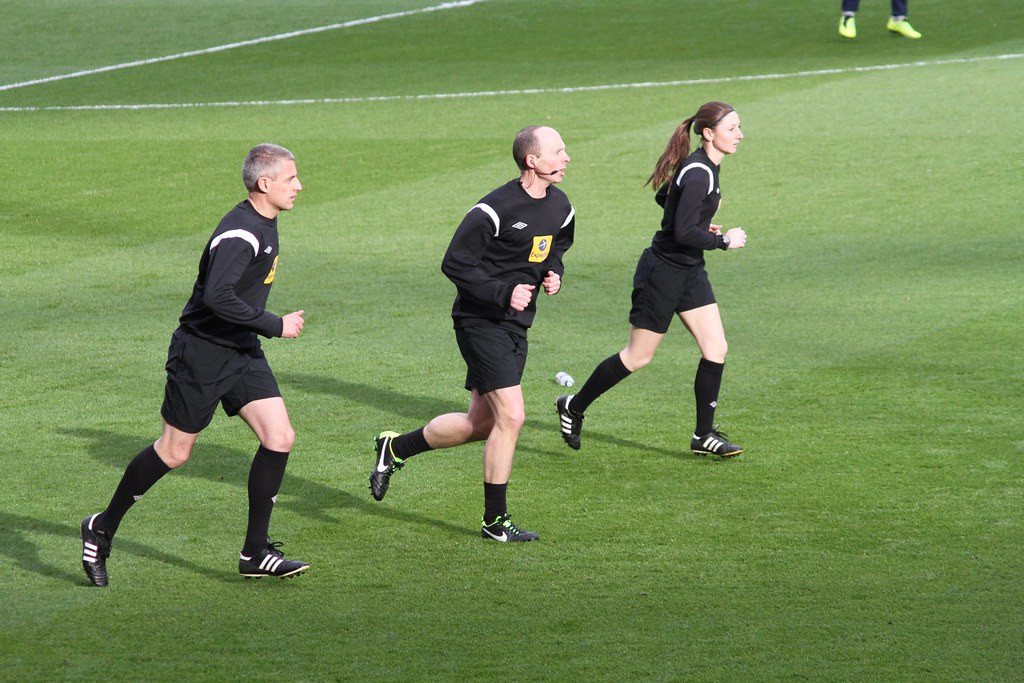Are you curious about the role of the fourth official in football? This guide explains their responsibilities before, during, and after the match, including their vital assistance to the referee. Discover the fourth official’s powers and more at CAUHOI2025.UK.COM! Explore key aspects like technical area management, substitution procedures, and handling misconduct.
Table of Contents
- What’s a Fourth Official In Football?
- What Does the Fourth Official Do?
- Before the Match
- During the Match
- After the Match
- When Was the Fourth Official Introduced in Football?
- Can the Fourth Official Make Decisions?
- What Equipment Does the Fourth Official Need?
- Where Does the Fourth Official Stand?
- FAQ
1. What’s a Fourth Official In Football?
The fourth official in football plays a crucial supporting role to the referee and assistant referees. According to the Football Association (FA), the fourth official is there to assist the referee and assistant referees at all times, proactively dealing with players, substitutes, and club officials, especially during the match.
Often, the fourth official is also a qualified referee, prepared to step in and replace any of the primary match officials (the referee and two assistants) should they be unable to continue due to injury or any other reason. This ensures the game can proceed smoothly and fairly.
2. What Does the Fourth Official Do?
The fourth official’s duties are extensive, covering the period before, during, and after the match. Here’s a detailed breakdown based on the Football Association (FA) guidelines.
Before the Match
The fourth official undertakes several key tasks before the game begins:
- Technical Area Management: Ensuring only individuals listed on the official team sheet occupy the technical area. Reminding them that they must stay within this area during the match and behave responsibly, as stated by the FA.
- Coaching Restrictions: Reminding those in the technical area that only one person is permitted to give tactical instructions at any one time.
- Medical Staff Protocol: Instructing the team’s physio or doctor that they must receive permission from the referee before entering the pitch to attend to an injured player.
- Positioning: Determining their position near the touchline, ideally situated between the technical areas, to maintain a clear view of the game.
- Equipment Checks: Ensuring the electronic boards (or other communication methods) used for substitutions and indicating injury time are in place and functioning correctly.
- Ball Inspection: Checking the pressure of all replacement balls, providing a new ball when the referee instructs, except in matches using a multiple ball system.
- Briefing: Listening to the referee’s pre-match instructions and understanding the procedure if the referee or an assistant is unable to continue (e.g., due to injury).
During the Match
 Substitution – FA Carlsberg Vase Final 2009 – Glossop Nort… | Flickr
Substitution – FA Carlsberg Vase Final 2009 – Glossop Nort… | Flickr
During the match, the fourth official’s role becomes even more critical:
-
Assisting the Referee: Continuously assisting the referee, maintaining eye contact with the other officials to ensure smooth communication and awareness of the game’s flow.
-
Record Keeping: Maintaining a complete record of the game, including detailed notes of players who receive yellow cards (bookings) or red cards (sent off). This meticulous record-keeping is vital for post-match reports and disciplinary actions.
-
Substitution Management: Managing the substitution process, verifying that substitutes’ equipment is in order before they enter the field. The fourth official indicates substitutions using the electronic board, displaying the relevant squad numbers and recording the exact time of each substitution.
-
Injury Time Display: Displaying the minimum amount of injury time, as instructed by the referee, on the electronic board. The fourth official does not share their own estimate of lost time with the officials, ensuring consistency.
-
Medical Assistance Monitoring: Monitoring the entrance of the physio, doctor, and stretcher bearers onto the pitch, making sure the referee has granted permission beforehand.
-
Technical Area Control: Maintaining order in the technical area, promptly informing the referee of any irresponsible behavior. Such behavior may include:
- Anyone leaving the technical area to argue with the referee, an assistant, opponents, or members of the opposing technical area.
- Any act of abusive, insulting, offensive, or threatening language and/or gestures.
- Repeated non-compliance with the Laws of the Game, League Regulations, Competition Rules, or requests from the fourth official.
-
Reporting Misconduct: Informing the referee of any verbal abuse from within the technical area, or immediately reporting serious misconduct.
After the Match
Following the final whistle, the fourth official’s responsibilities extend to:
- Supervising Players and Officials: Following the referee’s instructions to supervise players and officials as they proceed through the tunnel area to the dressing rooms, acting as a witness if any incidents occur.
- Preparing Match Reports: Assisting the referee in preparing a comprehensive match report, detailing any misconduct, substitutions, breaches of technical area regulations, and other notable incidents.
- Submitting Incident Reports: Submitting a report to the relevant authorities regarding any misconduct or similar incident that occurred out of the referee’s or assistants’ view, while also informing the referee of any reports made.
3. When Was the Fourth Official Introduced in Football?
 Referees warm up | Ronnie Macdonald | Flickr
Referees warm up | Ronnie Macdonald | Flickr
The International Football Association Board (IFAB) formally introduced the fourth official into football in 1991. Initially, the primary reason for this addition was to have a designated replacement ready if any of the main match officials were unable to continue their duties during a game.
From the start, the role expanded to include overseeing substitutions, maintaining order in the technical areas for both teams, assisting the referee with incidents they might have missed, and accurately keeping records of yellow cards, red cards, and goals scored.
4. Can the Fourth Official Make Decisions?
While the fourth official does not have the authority to make independent decisions that directly impact the game, they play a vital advisory role to the referee. The referee can seek guidance from the fourth official if they and the assistant referees have missed a potentially game-changing incident. This might include possible yellow or red cards, as well as penalty decisions.
Furthermore, the fourth official is responsible for alerting the referee if the wrong player has been mistakenly booked or sent off, or if a player who should have been sent off after receiving a second yellow card remains on the field.
5. What Equipment Does the Fourth Official Need?
The fourth official relies on several key pieces of equipment to perform their duties effectively:
- Electronic Board: The electronic board is essential for communicating substitutions and injury time to everyone in the stadium. It clearly displays the players entering and leaving the field, as well as the amount of added time.
- PTT Headset: Many fourth officials use a Push-To-Talk (PTT) headset during games. They primarily remain in ‘listening mode’ so as not to disrupt the communication between the referee and the assistant referees. The fourth official can join the conversation when their assistance is needed, providing valuable input and observations.
6. Where Does the Fourth Official Stand?
The fourth official typically positions themselves between the two teams’ technical areas. This location allows them to effectively monitor and manage both technical areas, ensuring that order is maintained and any potential issues are addressed promptly.
When displaying injury time or indicating a substitution, the fourth official will usually stand roughly in line with the halfway line on the pitch. They raise the electronic board above their head to ensure that the information is clearly visible to all players, coaches, and spectators.
7. FAQ
Q: What is the main role of the fourth official in soccer?
A: The fourth official primarily assists the referee and other match officials, manages substitutions, and helps maintain order in the technical areas.
Q: Can the fourth official overrule the referee’s decisions?
A: No, the fourth official cannot overrule the referee. They can provide advice and information, but the final decision rests with the referee.
Q: What happens if the referee gets injured during a match?
A: The fourth official is usually a qualified referee and can replace the injured referee, ensuring the match can continue.
Q: How does the fourth official communicate with the other officials?
A: They often use a PTT headset to listen in on the communication between the referee and assistant referees and can join the conversation when necessary.
Q: What does the fourth official do after the match?
A: They assist the referee in preparing the match report, including details of any misconduct, substitutions, and other notable incidents.
Q: When was the fourth official first introduced in football?
A: The International Football Association Board (IFAB) introduced the fourth official into football in 1991.
Q: Where does the fourth official stand during a match?
A: The fourth official typically stands between the two teams’ technical areas to monitor and manage both areas effectively.
Q: Why is it important for the fourth official to check the players’ equipment?
A: To ensure that all players entering the field are properly equipped and that no unauthorized or dangerous items are brought onto the pitch.
Q: What is the role of the fourth official regarding injury time?
A: The fourth official displays the minimum amount of injury time, as instructed by the referee, on the electronic board.
Q: How does the fourth official help in maintaining discipline in the technical area?
A: By monitoring the behavior of coaches and other staff in the technical area and informing the referee of any misconduct or inappropriate behavior.
Seeking clarity on the role of football officials? At CAUHOI2025.UK.COM, we provide accurate, reliable, and easy-to-understand answers to your questions.
Visit CauHoi2025.UK.COM today to explore more insightful articles and expert advice, or contact us at Equitable Life Building, 120 Broadway, New York, NY 10004, USA, or call +1 (800) 555-0199.

